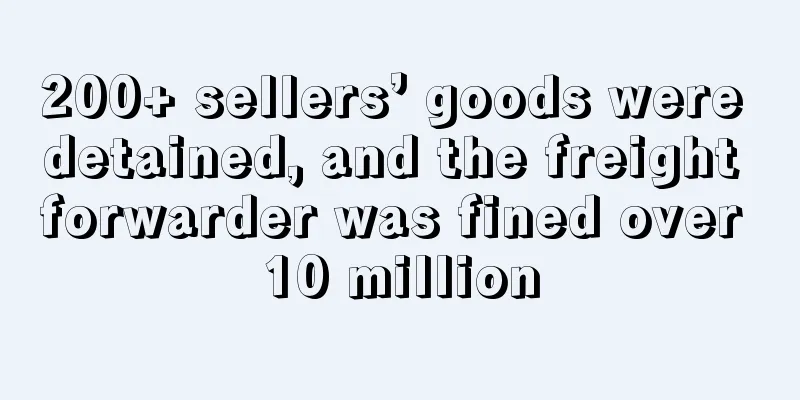200+ sellers’ goods were detained, and the freight forwarder was fined over 10 million

|
This year, there have been many cases of freight forwarding companies going bankrupt. Recently, 18 logistics companies had a series of "accidents" involving more than 200 sellers and fines of more than 10 million yuan. Just when industry insiders were speculating whether these companies would go bankrupt, they jointly issued a statement: no bankruptcy, no hardship, and called on customers to work together to solve the problem.
Freight forwarders and sellers are closely connected. In addition to the "accidents" at 18 logistics companies, another freight forwarder's warehouse was robbed, resulting in the loss of goods worth 2 million yuan. In this eventful year, perhaps freight forwarders and sellers should have more trust and sincerity.
200+ sellers’ goods were detained, and 18 logistics companies issued a joint statement
A recent joint statement issued by 18 logistics companies has sparked heated discussions in the cross-border circle. The statement mentioned a series of problems that occurred in the Belgian EQ2 warehouse since the end of October, including the suspension of goods in and out and the closure of the warehouse. The final fine amount was determined to be 1,394,487.12 Euros (approximately 10.28 million RMB), involving more than 200 customers, 43,085 boxes of goods, and a total VAT of 784,728.61 Euros, causing huge losses to both customers and logistics companies.
After meeting and discussing with Belgian customs clearance representatives, 18 logistics companies decided to quickly clear out the goods in the warehouse by paying fines to protect their customers' products.
The statement mentioned that according to past industry practices, when European customs seized goods, some freight forwarders chose to "go bankrupt" and ask customers for money to redeem the goods, while some freight forwarders chose to resist. This time, the common choice of the 18 logistics companies was not to go bankrupt or resist.
In response to this incident, the customs has consolidated all the goods and will not release the warehouse until the full fine is paid. In response, all logistics parties require customers to bear at least half of the fine before they can pick up the goods.
In addition, the 18 logistics companies also stated that too many responsibilities have been imposed on logistics companies, so they jointly called on the industry to legislate as soon as possible to clarify their respective responsibilities, obligations and boundaries.
In fact, as the statement mentioned, the detention of goods in the Belgian warehouse occurred at the end of October. At that time, Yien.com also reported on it. A logistics company (perhaps one of the 18 companies) notified its customers that 6 cabinets were inspected at the back end of the company, and the handling fee for each cabinet was 300,000 yuan. Due to insufficient funds, the company paid 100,000 yuan itself, and the remaining amount was distributed to each customer. This operation shocked people in the industry, and the sellers and customers became the victims.
Now, 18 logistics companies require customers to bear half of the costs, and this solution does not seem to be much different from the previous one. A seller complained: "Customers pay the freight normally, so the logistics companies make all the money, but when something goes wrong, customers have to share the cost."
The cargo inspection at the Belgian warehouse this time was a violation of the European double-clearance tax package. Tax evasion is common on European routes. Some freight forwarding companies use double-clearance tax package to take advantage of the loophole of under-reporting. Once discovered, the customs will trace their previous violations, and it will be difficult to settle the matter peacefully. Most European customs clearance is carried out in Belgium or Poland. This year's inspection in Belgium led to the investigation of the accounts of 18 logistics companies and the detention of goods.
In addition to the concentrated detention of goods, the European market has not been peaceful recently. Several sellers’ high-value goods have been lost in British overseas warehouses. The detained goods may be recovered, but the lost goods may not be.
The warehouse was robbed and goods worth 2 million were lost
Li Mingjuan, a freight forwarder in the industry, revealed that a seller’s client had lost goods, and said that the overseas warehouse refused to compensate for the lost goods.
According to Li Mingjuan, she got to know an overseas warehouse in Shenzhen through a friend in the first half of this year. It happened that she had received goods from a customer and needed overseas warehouse services. After a brief understanding, she began to cooperate with this overseas warehouse.
Just last month, the overseas warehouse manager suddenly sent a message to inform Li Mingjuan that the UK overseas warehouse had been robbed and their goods had been stolen. This was undoubtedly a bolt from the blue!
When she first learned that the goods were lost, the business manager of the overseas warehouse said that compensation would be made according to the value of the goods. However, Li Mingjuan was not reassured afterwards. She met with the owner of the overseas warehouse twice, but the results were not satisfactory.
"The first time I went there, he said it was due to force majeure and asked us to provide the purchase value of the goods. After we provided it, he denied it and asked us to provide the customs declaration form. He had a very bad attitude during the talk and we didn't reach an agreement. Later, we went to talk for the second time, but we still couldn't come to a conclusion. We wanted to invite the three companies out to solve the problem together, but he was unwilling to do so. He also said that the compensation would be 40 yuan per kilogram, which is only one-tenth of the value of the goods." said Li Mingjuan.
Li Mingjuan further introduced that she had actively requested for both interviews, but the boss of the overseas warehouse had no attitude of mediation at all. He also said that even if he knew the value of the goods, he would not necessarily compensate, and the two parties could offset the compensation through subsequent cooperation.
"Because the overseas warehouse is still in operation, he must hope to slowly make up for the losses, but I dare not cooperate with such an overseas warehouse again." Li Mingjuan was helpless.
In Li Mingjuan's view, cross-border sellers entrusted the goods to her as an agent based on trust. Now that the overseas warehouse she found caused the loss of goods, she held a certain responsibility. Since they were long-term customers, Li Mingjuan reached a settlement with the seller first.
According to the relevant purchase certificate issued by the seller, the value of the lost goods was close to 600,000 yuan. After negotiation with the seller, Li Mingjuan compensated the seller about 400,000 yuan. After reaching a compensation settlement, the compensation for the lost goods changed from three parties to two parties, she and the overseas warehouse.
It is worth noting that the overseas warehouse that lost more than one shipment of goods this time, according to the information Li Mingjuan has, including her goods, a total of 4 shipments of goods were lost this time, the other 3 shipments were a whole cabinet of electric vehicles, a Bluetooth speaker and a fascia gun. The number of bicycles in the whole cabinet was relatively large, with more than 100 items.
Li Mingjuan learned from a friend that the value of these four shipments was as high as more than 2 million yuan. At present, the sellers of other lost goods have not reached a compensation agreement. The overseas warehouse owner still wants the owners of the lost goods to help him recover the losses with the purpose of subsequent cooperation.
"Under normal circumstances, such a large amount of goods would not be lost. I consulted some colleagues who run overseas warehouses in the UK, and the information I got was that such petty thefts do exist in the local area, but not on such a large scale. A whole cabinet plus half a cabinet of goods were stolen directly, which required a truck. In this case, the warehouse alarm and surveillance would definitely give an alert." Li Mingjuan said.
When the overseas warehouse owner refused to pay compensation due to force majeure, Li Mingjuan asked him whether he had called the police after the goods were lost. He said he had called the police, but could not provide a relevant police report receipt. Li Mingjuan made a bold guess that she suspected that the overseas warehouse had embezzled the goods.
"The goods stolen this time were all high-value goods. It was obvious that someone had colluded with others to steal the goods, otherwise the thieves would not have easily found these products. Moreover, the staff of the overseas warehouse also told me that they had suspects, but they just had no evidence."
In fact, since the beginning of this year, due to the intensified internal competition in the freight forwarding industry and the reduction in shipments on the market, some unscrupulous operations in the freight forwarding industry have been staged one after another. In order to receive the goods, some freight forwarders have accepted the goods at super low prices. However, Li Mingjuan believes that the low price cannot be blamed for the loss of goods in this overseas warehouse. The price of the goods received by this overseas warehouse is the same as the market price, and there is profit to be made.
It is understood that the overseas warehouse involved in the lost goods is a fairly large freight forwarding company. In addition to overseas warehouse business, the company also undertakes other cross-border logistics business. The company has branches in Guangdong, Jiangsu and other places. Its boss is also the legal person of many companies. It is really unbelievable that such a logistics company can lose goods just like that.
At present, Li Mingjuan has filed a lawsuit against the overseas warehouse and consulted relevant lawyers. According to the law, the overseas warehouse needs to compensate for the lost goods according to the original value. The matter has now entered the normal prosecution procedure.
Whether the goods are detained or lost in batches, it is a huge loss for logistics companies and sellers. Both parties should work together to solve the problem instead of blaming each other. We also hope that the cross-border logistics industry will clarify their respective responsibilities and boundaries as soon as possible so that everyone can do things according to the rules. Freight Forwarding Double tax package Seizure |
<<: As the holiday season draws to a close, sales of these categories in the United States are weak
>>: Beware! A large number of cross-border sellers will be affected? Some have already been fined
Recommend
Shenzhen Dama made a comeback against all odds!
Recently , cross-border sellers have successively...
Official confirmation: There is new situation in Amazon account verification
Amazon account verification issues are still ongo...
Overseas brands that create panic and sell anxiety
"No matter how you look at it, it looks like...
Cainiao builds a global digital supply chain platform and joins hands with Delta to promote high-quality development of digital trade
In the office of Suzhou Delta, staff from both si...
Traffic has increased exponentially! Some sellers have daily sales of 30,000
The first half of the year is relatively the off-...
What is Lemon Tree? Lemon Tree Review, Features
Shenzhen Lemon Tree Technology Co., Ltd. is a high...
What is ACPR? ACPR Review, Features
<span data-docs-delta="[[20,{"gallery"...
Listing "infringement wave" has returned, and a large number of sellers have been frozen and fined!
Infringement has long been a nightmare for many s...
Amazon orders dropped sharply before Black Friday! Sellers: Peak season never came
Before Black Friday, Amazon sellers seem to be ex...
Flipkart still leads in Indian festive sales!
While Snapdeal is often considered the third larg...
Not only shipping costs, but also US inventory costs will increase?
As consumers and sellers worry about shortages of...
The worsening of the epidemic in India has impacted global shipping; US imports will surge, and Christmas shipping capacity may be insufficient
The global shipping industry is hit hard again. T...
There were 2 violations, Xiamen Dama received a warning letter
Xiamen Jihong Technology Co., Ltd. was establishe...
China's cumulative home appliance exports in 2020 reached US$83.7 billion, and AliExpress's Spanish site was exposed to sell counterfeit products
U.S. extends tariff exemptions on Chinese medical...
What is Bambora? Bambora Review, Features
<span data-docs-delta="[[20,{"gallery"...









